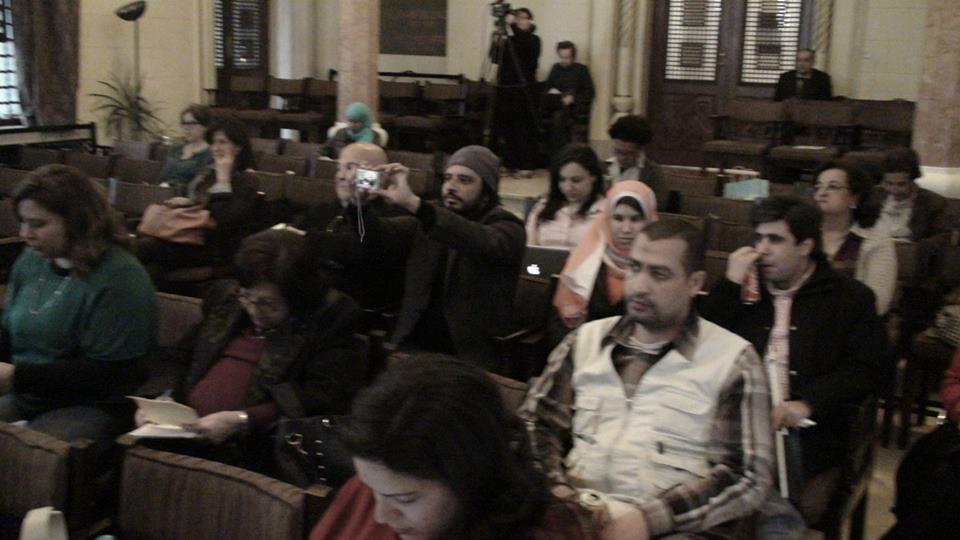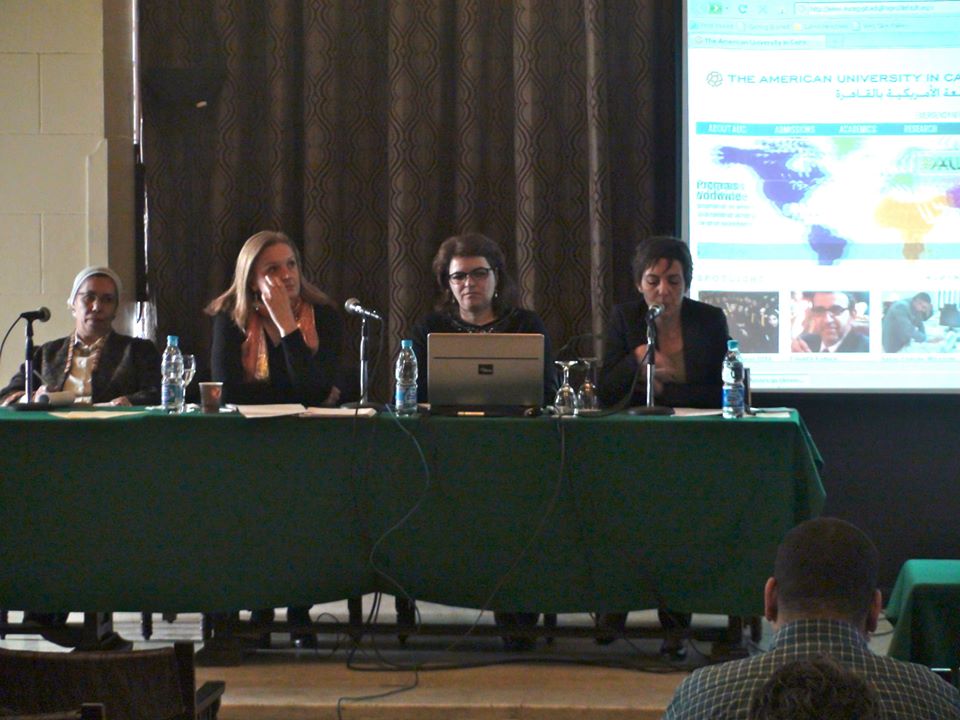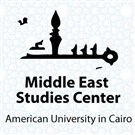On 15 March 2014, the Cairo Papers in Social Science (CPSS), in collaboration with the Middle East Studies Center at the American University in Cairo, hosted its twenty-second annual symposium titled “Disabilities, Revolution, and the Politics of Hope.” The CPSS, established in 1977 by social science departments at AUC, is a quarterly monograph series under the direction of Iman Hamdy.
The symposium brought together both academics and activists, in order to explore how different social thinkers and actors understand the body’s relationship to the state. With that, panelists from Egypt, Lebanon, Tunisia, Armenia, the United States, and beyond came together to share their rich struggles of the past three years, offering hope for unfinished revolutions everywhere.
In many ways, the fight for rights for people with disabilities speaks to the heart of the uprisings that have swept the region since 2011. In the words of Sherene Seikaly, the director of AUC’s Middle East Studies Center, the demand for access and services “destabilizes the exclusionary forces that dictate what is ‘normal,’” creating new configurations that challenge static models of society. In their fight for inclusion, disability activists exemplify the forms of resistance practiced by revolutionaries over the past three years.
Starting with an historical approach, panelists challenged the very category of “disability,” calling it a modern construct that does not speak to lived experiences of the past. In her survey of the state of disability studies today, Sara Scalenghe of Loyola University invited attendees to imagine a radically different conception of the “abled” and “disabled.” Drawing from her research, Scalenghe used examples from the Ottoman-era Levant and Egypt to present an alternative “culture of accommodation and inclusion.” Analyzing everything from jokes to court documents, Scalenghe found a different representation of disability from that of contemporaneous medieval Europe, seeing instead a tradition of inclusion in the Arab Ottoman lands. Disability was not associated with intellectual diminishment, and indeed even the Ottoman sultan was said to be fluent in sign language. While such levels of inclusion might seem like wistful thinking today, Scalenghe’s lecture depicted a moment when it was not only possible but rather standard practice, offering a viable vision of “what could have been.” Moving forward, Scalenghe suggested that the next step in Middle East disability studies is to focus on the nineteenth and twentieth centuries, charting the rise of colonialism and industrialization to see what opportunities are lost or opened for people with disabilities. Importantly, Scalenghe identified the need to examine how citizenship in the modern state became increasingly dependent on “ability” when this was not the case before.
In a first step to filling that gap of scholarship in the modern period, Omar Dewachi of the American University in Beirut used disability compensation in Iraq to examine new conceptions of citizenship in the post-colonial state. Building off Michel Foucault’s notion of biopolitics, Dewachi argued that “disability” only became visible in the nineteenth century with the emerging category of the “population” and the subsequent compulsion of states to count that population using new sciences such as statistics. Dewachi positioned the welfare states’ anxieties towards people with disabilities as linked to a concern for productivity in a time of increased industrialization. Charting disability compensation laws over three decades of differing wars in Iraq, Dewachi underlined how, in light of shifting power balances, population tensions regarding disability take on a political dimension. With each radical regime change, Dewachi argued, comes a new decision of which bodies should be “included,” making disability and politics deeply entwined. With that, Dewachi articulated not only a “politics of disability,” but also the related idea of “disability as politics,” whereby politically-marked disabilities are articulated as claims of citizenship and compensation from the state. Dewachi emphasized that even when this politics translates into increased legal and state-sanctioned inclusion for some groups, it necessarily entails more explicit exclusion for others.
The relationship between disability movements and the formal institutions of the state was a recurring theme throughout the day. Opinions differed on whether state inclusion may be counterproductive to disability movements’ aims. For some, pushing the state for rights of the “disabled” reifies categories of what is “normal” and “abnormal” in the first place. This was the case for the disabilities movement in Lebanon, which, emerging in the mid-1980s, began as a popular call for a rights-based state approach to disability. According to Maha Damaj, a long-time disabilities activist from the American University in Beirut, the fruit of this early movement was Lebanon’s Law 220. Many activists considered the law, ratified in 2000, to be one of the most progressive legal definitions of disability for its time. However, as Damaj demonstrated, despite the law’s progressive face, the structure of power governing people with disabilities remained unchanged. With the establishment of the twenty-member National Committee for Disabled Affairs, of which only eight members are people with disabilities or disability activists, the Lebanese state streamlined channels for rights claims, eliminating competing avenues in the process. Despite gains on paper–a rights-based definition of disability, a governmental body for administrating disability affairs–Damaj described today’s disability movement in Lebanon as “weakened” due to in-fighting and the state’s exclusionary “divide and conquer” tactics. In order to move forward, Damaj suggested, the disabilities movement must recognize its own heterogeneity and forge a model that reflects this, understanding that the NCDA is not the only voice for people with disabilities in Lebanon. “Inclusion,” according to Damaj, cannot merely mean the creation of parallel structures for people with disabilities, but rather requires comprehensive changes to existing state policy and operations.
Damaj’s discussion opens the door for a stronger critique of rights-based regimes, showing that even when states adopt the language of rights movements, they do not necessarily enact those movements’ demands. The experiences of Imed Ouertani, of the Tunisian Organization for the Defense of Rights of Persons with Disabilities, aptly demonstrated this phenomenon in the context of pre- and post- revolution Tunisia. Although Tunisia was one of the first countries to ratify the International Convention for the Rights of People with Disabilities (CRPD), the state’s commitment to disability rights, according to Ouertani, essentially served as a front to obscure other state-led rights abuses. The pre-revolution Tunisian state maintained a tight grip on the movement, with the former president’s wife leading the main NGO for disabilities. After a popular revolution toppled the regime in 2011, Ouertani stated, disability activists struggled to advocate their claims using the existing organizations for people with disabilities. It was only after disability activists formed a fresh coalition, uniting the full spectrum of Tunisia’s disability movements, that were they able to penetrate the new political landscape, and with awe-inspiring results. Ouertani described the joy he felt when watching members of Tunisia’s constitutional-drafting committee “speak our language” and “use our examples” during debates on the 2014 constitution’s disability article, all due to the intense lobbying efforts of Ouertani and other disability activities. Of course, as previous examples show, inclusion in the state’s legal apparatus does not mean the fight for rights for people with disabilities is over. As Hanan Sabea, an anthropologist at AUC remarked, state performances of inclusion, as a demonstration of good governance for local and international audiences, is not real inclusion. While disability activists in Tunisia have achieved amazing legal accomplishments, the question that remains, according to Sabea, is: “What next?”
Discussions throughout the day touched upon the limits of the law, once put into practice, to enact real inclusion for people with disabilities. Moving from the national to the international, Lila Meadows of the Refugee Legal Aid Project in Cairo gave an insider’s perspective to the opportunities afforded by international legislation regarding disability. Working to help refugees apply for resettlement through the UN High Commission on Refugees (UNHCR), Meadows highlighted the multitude of obstacles refugees face for inclusion, despite the seemingly large canon of law designed to address such issues. For refugees with disabilities, these obstacles increase ten-fold. With the capacity to settle only two thousand refugees living in Egypt each year, the UNHCR delineates a strict hierarchy of needs to qualify for resettlement. Because there is no special category of consideration for people with disabilities, these candidates are considered under the same rigid resettlement categories as other refugees. This is despite the fact that these categories often do not illuminate how disability may heighten vulnerability. Although there are other existing international legal frameworks for people with disabilities, such as the CRPD (itself a UN treaty), the UNHCR has not incorporated this protocol into the resettlement criteria. Because there are few enforcement mechanisms in international law, Meadows argued that it is extremely difficult to hold international organizations accountable for their own standards, highlighting the huge gap between how international law is written, and how it then is applied.
In light of the enormous struggles that disability activists face in the fight for inclusion, what can be said for a “politics of hope?” In the words of Malak Rouchdy, a sociologist at AUC, disability activists help us grasp at moments of hope in contexts of despair. For Dr. Heba Hagrass, an Egyptian international disability consultant, hope might exist in those rare moments where the space for rights claims open, allowing for small victories after decades of struggle. According to Hagrass, the hundred-member 2012 constitution drafting assembly did not have a single disability representative on board, with Egyptian political leaders playing mere lip-service to inclusion. However, the 2013 committee actively solicited the input of disability activists, including that of Hagrass, who served in an advisory capacity. Egypt’s 2013 constitution now has eight articles that mention people with disabilities, with Article 81 explicitly addressing disability rights.
As activists like Hagrass push for legal inclusion, others, like Nairy Avedissian, a freelance consultant on arts and disability in Egypt and Armenia, work to change social stigma against disability on the ground. Describing her experience programming inclusive cultural events for the British Council in Cairo, as well as with Noon enterprise, Avedissian highlighted the arts as an important tool for advocacy and education. Given that most panelists cited societal stigma as the single largest barrier to people with disabilities, the work of Avedissian inspires hope that small, incremental changes in perceptions of disability are being made. In the end, as Ouertani proclaimed, “all activists have is hope.” The real activism, according to Ouertani, is to create another activist, and to make someone else “believe that the situation can be better.” Based on the experiences of the CPSS panelists, it is clear that disability activists continue to work towards this goal. People with disabilities in Egypt were early pioneers in protesting outside parliament, and when the revolution in Tahrir began they were some of the very first to occupy the square. Importantly, as Hagrass recounted, disability activists joined the protest at citizens of Egypt first, showing solidarity for the movement’s broad demands of “bread, freedom, and social justice.” The activist who can do that, who understands that injustice for some is injustice for all, is truly a vision of hope.


![[Logo of the American University in Cairo Middle East Studies Center. Image from aucegypt.edu]](https://kms.jadaliyya.com/Images/357x383xo/mescauc.jpg)
















